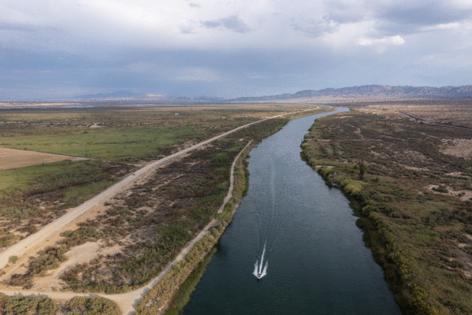Trump administration nominates official to oversee Colorado River negotiations
Published in News & Features
As Nevada and its neighbors argue and a deadline looms, the Trump administration has chosen the official who will oversee contentious Colorado River negotiations if approved by the U.S. Senate.
Ted Cooke, who managed the Central Arizona Project from 2015 to 2023, would be the leader of the federal agency that manages water and dams in the West, according to a nomination list on the Senate’s website. The Central Arizona Project is a 336-mile pipeline system that brings Colorado River water to Arizona’s dense urban centers.
“This is no time for somebody with a learner’s permit,” John Entsminger, Nevada’s Colorado River czar and general manager of the Southern Nevada Water Authority, said in an interview Tuesday. “We need someone like Ted who has been there and done it.”
Entsminger pointed out that Cooke was a main architect of the 2019 Drought Contingency Plan, a series of conservation agreements in the Lower Basin that both chambers of Congress passed unanimously during the Trump’s first term.
It’s a testament to Cooke’s ability to navigate partisan politics in Washington, D.C., and still deliver on complex water conservation issues, said Kyle Roerink, executive director of the Great Basin Water Network that focuses on water scarcity in Nevada and Utah.
“We have to talk about this in a way that transcends the political divides,” Roerink said. “It’s an environmental issue, but this is a survival issue for the 25 million people downstream of Glen Canyon Dam.”
A turbulent time
Cooke would replace Las Vegas native Camille Calimlim Touton, former President Joe Biden’s appointee who leveraged historic federal funding to broker conservation agreements across the Colorado River Basin with farmers, tribes and more.
Much of that funding has been recalled and is now in short supply due to the Trump administration’s purge of appropriations from the Inflation Reduction Act and Bipartisan Infrastructure Law.
And then there’s the elephant in the room: Nevada, California and Arizona — the Lower Basin states — continue to disagree with the Upper Basin states of Colorado, Utah, New Mexico and Wyoming on a path forward before Colorado River guidelines expire at the end of 2026.
Entsminger, who said he’s worked closely with Cooke on partnerships between Nevada and Arizona, said he’s confident that he will be a fair arbiter to help the states strike a deal that works for everyone.
All eyes have been on the clock as time runs out to reach an agreement, with some floating the possibility of a lengthy court case should some of the states be unhappy with the Bureau of Reclamation’s final decision.
“He’s not somebody who’s going to have to come up to speed on these issues,” Entsminger said. “I think a lot of people could do the job, but I’m really happy to have somebody who’s going to hit the ground running on day one.”
The reclamation bureau, which deferred to the White House for comment, has the final say on the outcome of these interstate negotiations if states cannot reach a consensus. The White House didn’t respond to a request seeking comment on Tuesday, nor did the Arizona Department of Water Resources.
A Central Arizona Project spokesperson praised Cooke as a leader who is “knowledgeable, fair and solutions-focused.”
Becky Mitchell, Colorado’s Upper Colorado River commissioner who generally speaks on behalf of the Upper Basin, declined to comment when her representative was reached on Tuesday.
Advocates are hopeful
Those who work on water issues along the Colorado River were impressed with the nomination.
Roerink, of the Great Basin Water Network, said Cooke seems like the right choice to provide a sense of stability in an era of uncertainty.
“From an environmental perspective, we’re under no illusions that he’s going to be calling to tear down dams or veer radically from from past commissioners,” Roerink said. “But I think he’s going to have an ideology that is going to be much more focused on reduction of use rather than appropriating more uses.”
Roerink and others have long called for repairs or the removal of Glen Canyon Dam above Lake Powell, the engineering problems of which the bureau has acknowledged could affect water deliveries in the Lower Basin. He’s said that the basin can’t afford the construction of new reservoirs or diversions, too.
Some have speculated whether Cooke’s Lower Basin background could sway his allegiances in the bitter negotiation process. Past commissioners have come from both the Lower and Upper Basins, tasked with finding solutions that work for all.
John Berggren, a regional policy manager for Western Resource Advocates, said it’s a good sign that states are meeting and the federal government has been at the table this year.
Notably, Entsminger and other state representatives broke from tradition and skipped out on the Getches-Wilkinson Center’s Colorado River conference in Boulder, Colorado, signaling that they might be further from consensus than previously thought.
Tensions were high in Las Vegas last December, when negotiators traded expletives on two separate Colorado River Water Users Association panels and blamed one another for why they didn’t meet as a group.
“The timelines for these negotiations are already incredibly tight,” Berggren said. “There’s a deadline, and the states have not reached a deal. They need to keep the ball rolling as fast as possible.”
Cooke’s nomination was referred to the Senate’s Committee on Energy and Natural Resources, according to Congress’ website.
_____
©2025 Las Vegas Review-Journal. Visit reviewjournal.com.. Distributed by Tribune Content Agency, LLC.







Comments